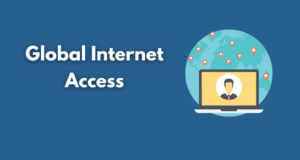The world’s increasing interconnectedness belies the stark reality of millions left out of the digital realm. This exclusion, known as the digital divide, impacts not just individuals but also hampers global economic progress and development.
Recent statistics underscore the magnitude of this issue, revealing a substantial segment of the global populace without internet access. This necessitates the exploration of novel solutions to enhance global internet access. Free VPNs emerge as a viable option, enabling secure and private online experiences for marginalized communities.
Through the strategic application of smart technology and free VPNs, we can start to close this gap. This endeavor not only broadens individual prospects but also paves the way for a more just and inclusive digital environment. Such efforts are critical for fostering a more equitable global society.
Understanding the Digital Divide in Global Internet Access
The disparity in global internet access, commonly referred to as the digital divide, is a complex issue. It manifests as an unequal distribution of internet access across various regions, communities, and socio-economic groups. This phenomenon highlights the profound disparities in the digital landscape.

Current Statistics on Global Internet Inequality
Recent statistics reveal the stark reality of internet inequality. The International Telecommunication Union (ITU) reports that, as of 2022, approximately 2.9 billion people remain disconnected from the internet. The majority of these individuals reside in developing countries. Factors such as geographical location, income level, and age exacerbate this digital divide.
The ITU further indicates that while 80% of individuals in developed countries utilize the internet, this percentage plummets to 47% in developing nations. These figures starkly illustrate the significant disparities in global internet access.
Barriers to Internet Access in Developing Regions
Several barriers contribute to the digital divide in developing regions. A primary obstacle is the lack of infrastructure, as many areas lack the necessary telecommunications infrastructure to support internet access. High costs associated with internet services and devices further hinder accessibility for low-income populations.
Censorship and regulatory barriers also play a role in limiting internet access. In some regions, governments impose strict controls on internet content, restricting access to information and hindering the free flow of data.
How Free VPN Technology Bridges Digital Gaps
The advent of free VPN technology is revolutionizing global internet access, bridging the digital divide. This divide is influenced by geographical location, economic status, and government policies. Free VPNs are instrumental in addressing these challenges.
Overcoming Censorship and Geo-Restrictions
Free VPNs are key in overcoming censorship and geo-restrictions. Governments worldwide impose strict internet censorship, limiting access to information and stifling free expression. These VPNs enable users to bypass such restrictions, accessing a vast array of information and resources. By encrypting internet traffic and masking IP addresses, they ensure a secure and private web experience, even in regions with strict online controls.
Providing Secure Access in Public Networks
Free VPNs also ensure secure access to public networks, critical for individuals in developing regions or those using public Wi-Fi hotspots. Public networks are susceptible to hacking and surveillance, posing a risk to personal data. Utilizing a free VPN, individuals can safeguard their online activities from interception, ensuring a safer browsing experience. This is vital for underserved communities, who often rely on public networks for internet access.
Security Benefits for Underserved Communities
The security benefits of free VPNs are profound for underserved communities. These communities face heightened risks when accessing the internet due to limited online security awareness. Free VPNs provide a straightforward solution, safeguarding users’ online activities and protecting their sensitive information.
Cost-Effective Solutions for Limited Resources
For communities with limited financial resources, free VPNs offer a cost-effective means to access the internet securely. Traditional VPN services are often prohibitively expensive, making them inaccessible to many. Free VPNs fill this gap, providing essential security and privacy features without financial burden. They are invaluable in expanding global internet access and bridging the digital divide.
Smart Tech Solutions for a Connected Future
In our journey towards a more interconnected society, smart tech solutions are indispensable in bridging the digital divide. The integration of cutting-edge technologies is vital for expanding global internet access and fostering digital equality.
Innovative Approaches to Internet Distribution
New strategies for internet distribution, such as satellite internet and community networks, are being explored to reach underserved areas. These innovative approaches aim to offer reliable and affordable internet access to communities globally.
The Role of Free VPN Services Like Planet VPN
Free VPN services like Planet VPN are key in promoting global digital inclusion. They provide secure and private internet access, enabling individuals to bypass censorship and geo-restrictions. This helps bridge the digital divide.
Measuring Impact on Global Digital Inclusion
The effect of these solutions on global digital inclusion can be assessed by monitoring internet accessibility, affordability, and connectivity rates. This data will aid in refining strategies to further expand global internet access.
Conclusion: Advancing Digital Equality Through Accessible Technology
In our increasingly interconnected world, the significance of digital equality is profound. Free VPN technology and smart tech solutions are vital in bridging the digital divide. They ensure secure and accessible internet access for underserved communities.
Using accessible technology, such as VPN services like Planet VPN, enables individuals and organizations to promote global internet access. This fosters a more inclusive digital landscape. Such advancements can drive economic growth, improve education, and elevate overall quality of life.
To advance digital equality, a multifaceted approach is necessary. It must incorporate innovative technologies and collaborative efforts. As we progress, prioritizing accessible technology is essential. We must continue striving for a more equitable digital world.











